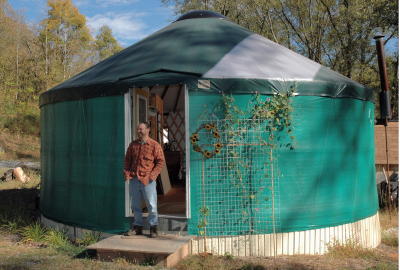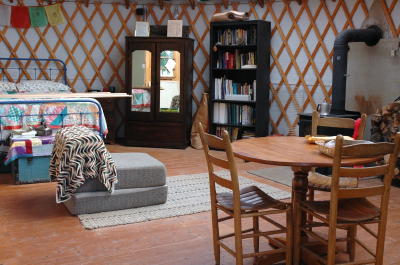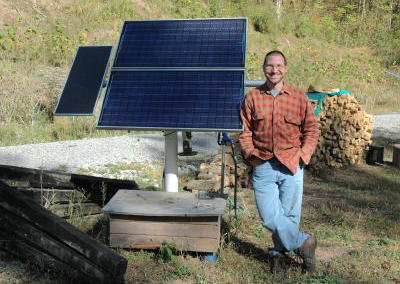GSC STUDENT SENDS ECO-FRIENDLY MESSAGE - From His Eco-Friendly Home

John Brown stands in front of his eco-friendly yurt
Submitted by Bob Edwards
Public Relations Dept. Asst.
Glenville State College
Glenville, WVâJohn Brownâ¦it is a common American name. However, Glenville State College student John Brown is anything but your everyday average American citizen. This John Brown is a person of vision, purpose, concern, and resourcefulness. He is a man who understands the beauty of nature and just how fragile she is.
Brown is a junior Education Major at GSC, specializing in Science and Math grades 5-9. He tutors students at Calhoun County Middle High School once a week, and is a teacher's assistant in the GSC Science Department. Brown was the GSC Pioneer Mascot during the 2005-2006 school years, but none of this is what makes John Brown so uncommon. The uniqueness of John Brown is in his footprint, the footprint that each and every one of us leaves on this world. Concerned for the effects that the extravagant lifestyles of today's society has on our environment, Brown is determined to live in a manner that sets an example that we can live comfortably, with almost any amenity that we want, yet do it in a way that will be less destructive to this Earth.
Brown lives in a yurt. Webster describes yurt as a circular-domed tent stretched over a collapsible lattice framework, used by the pastoral people of inner Asia. Brown lived in the GSC dorms during his freshmen year and lived in a log cabin prior to that, but he was looking for a smaller, environmentally friendlier place to live. He discovered the yurt on the internet, did some research, decided it would serve his purpose, and that he could build it himself. In August of 2005 John, his Dad, and a couple of friends constructed the yurt in just 3 days. They started on Friday, and John moved in on Sunday. The yurt has seen many improvements since then, but the basic structure is basically the same.
The yurt has lattice work walls covered with bubble wrap for insulation and covered with a vinyl tarp. The domed roof is sewn from sturdy vinyl and has a large skylight to provide natural light and heat from the sun.

Living area inside yurt

Solar panels power unique home
John's home has 453 square feet of floor space. There is a bathroom, a kitchen, and a general living area. It has city water and sewer but no other utilities. The yurt is heated with a wood stove when needed or by convection heat from the sun. Solar panels and storage batteries provide all of the necessary electricity. Brown cooks with a wood stove or bottled propane. He has a computer with wireless internet service, a cell phone, and electric lights. Brown intends to add a window or two to the structure and has plans to construct a bio-gas generator that would produce methane gas from cow manure to replace the propane he now uses. The yurt has just about everything that a more conventional home would have; it is just smaller, less expensive. Brown said, "It leaves a much smaller footprint on our environment."
So far Brown's yurt has cost him an incredible $9,300! A warm, comfortable place to live for less then $10,000. For Brown, a responsible way to live. His modest home costs less, used less building materials, doesn't use electricity produced by burning coal and derogating the atmosphere, is simply more environmentally friendly, and is just what he was looking for. Brown doesn't even have to waste gasoline driving to classes; his yurt is located off Elm Street in Glenville, just over the hill from GSC, an easy commute on foot.
Brown does not know of anyone else in West Virginia living in a yurt. "There are some State Parks that have yurts for rent to visitors. There are a few yurt communities in the Western United States," said Brown.
Brown's outlook on how he lives is not simply a passing fancy, it is how he intends to walk through life. After graduating from GSC in May of 2009, Brown would like to teach during the school year and work as a naturalist for the State Park system in the summers. "I love working with kids, and I hope I can pass along an appreciation for the delicacy of our natural world and teach them to respect and care for their environment," said Brown. "If we all would try to lighten our footprint on the environment just a little, it would make a huge impact on the earth," words to live by from a not so common man.
To learn more about John Brown's yurt visit his website at www.barefootboy.com - You can contact Brown at sendjohnmail@yahoo.com